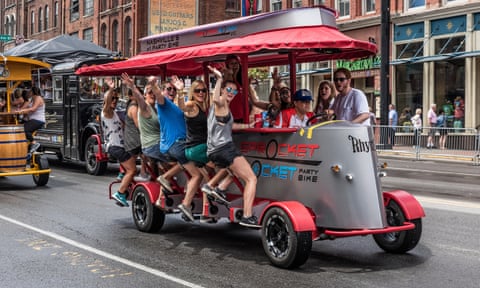If you are looking for signs of Nashville’s entrepreneurial spirit, ask Robbie Goldsmith why he decided to quit his job.
“I used to live downtown and we’d go out on Broadway because it was fun and we naturally saw more and more of these bachelorette parties and they would come up to [me] and ask what [they] should do.” What Goldsmith did was quit his corporate job to start his company, Bach Weekend, he explains as he walks down Broadway, which despite the early afternoon hour is already giving out a party vibe with the waft of spilled beer and burgers drifting across the wide sidewalks.
Sidewalks, Goldsmith says, that had to be expanded when tourism numbers skyrocketed in recent years.
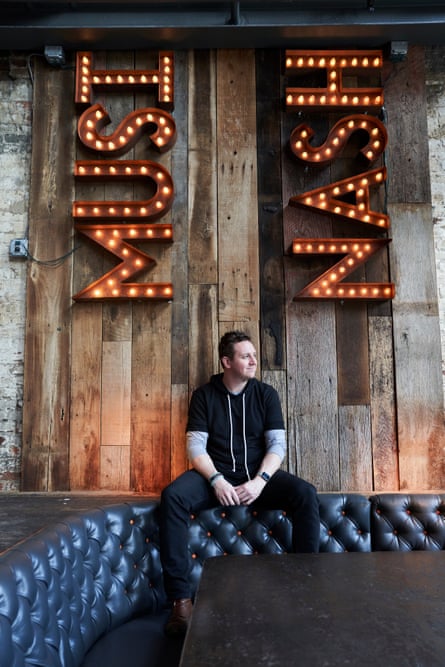
Approximately 14 million people visit the city each year, the Chamber of Commerce estimates. This year, around 100,000 are due to show up in late April alone for the National Football League (NFL) draft. In explaining its choice of city, the NFL published a list citing Nashville’s music, barbeque, and Broadway as factors making it the perfect location for 2019.
Nashville, unequivocally, is an economic success story, and not just in recent years, when outlets like the New York Times dubbed it the “it city”.
The mid-size southern city has been firmly financially rooted in a sprawling healthcare services industry and Christian book publishing since the 1980s, and has been growing for some time. With a burgeoning tourism industry laid on the foundation of its entertainment bedrock, the success of its economic development is clear amid the gentrifying neighborhoods and throngs of visitors passing shoulder-to-shoulder as they peruse the live music options while vying for bar seats.
“We just hit the perfect time of Nashville becoming a booming city,” Goldsmith yells over live music at the George Jones. Part of his success, he guesses, is because about 87% of the country is within driving distance of Nashville.
As Goldsmith strolls the main drag here, he points out that none of the bars downtown – from the purple-painted staple Tootsie’s, to the two-storey George Jones, to the expansive Jason Aldean Rooftop bar – charge a cover fee. They don’t need to: he estimates the average bachelorette and each of her friends or family members spends around $1,000 while in Nashville. And given that Goldsmith estimates around 150,000 visitors dance, drink, and selfie their way through Nashville each year, this equates to about $12m in revenue. Goldsmith’s services have become so popular that Country Music Television gave him a reality show for a season as his company escorted partygoers around the city.
But Tennessee’s capital is attracting more than just raucous weekend visitors. Nashville, once primarily known as the capital of country music, is now also one of America’s fastest-growing cities, and its economy is often cited as a successful model.
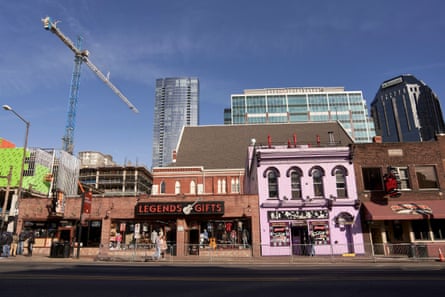
Around 94 people moved here on a daily basis in 2017, according to a 2018 report from the Nashville Chamber of Commerce, and the city has added nearly 400,000 new residents in the past decade.
Attracting them are 40,000 businesses, and growing, in the metropolitan area. These will soon to include Amazon when it opens a new operations centre downtown, promising 5,000 well-paid new jobs.
Such growth inevitably creates issues, said Anne Barnett, the co-chair of Stand Up Nashville, a community labour organisation representing the rights of working people in the city. As it battles the impacts of gentrification, transport pressures and the construction boom, Nashville is trying to maintain its unique sense of identity and accessibility.
“One of the things that makes Nashville Nashville is its rich culture of art and food, and most of that doesn’t come from the most wealthy,” Barnett said. “It comes from the folks that are middle-class and below middle-class.
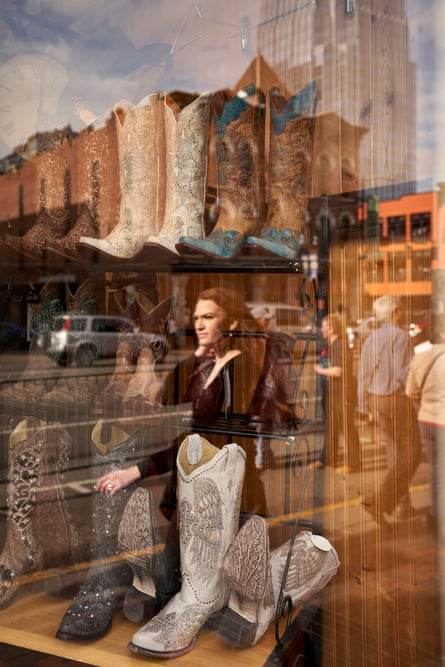
“As people are getting pushed out of the city, these really cherished institutions – even restaurants and music venues – are being torn down to build these mix use developments. Whole neighbourhoods are being basically wiped out and rebuilt.
“The longer that is allowed to go on, Nashville is going to lose its culture, which is why people want to move to Nashville in the first place.”
Barnett recently visited Amazon’s hometown, Seattle, where she says she saw an extreme housing and homeless crisis. With those issues already plaguing Nashville, she worries about how much worse it might get when Jeff Bezos’s tech behemoth arrives in the city.
Nashville’s city council this month approved a $17.5m incentive package for Amazon, despite concerns around how well paid those jobs will turn out to be, and the wider anxieties around Big Tech coming to town that scuppered Amazon’s New York City plans. Barnett wonders how many of those jobs will go to city residents versus city transplants and, if the majority of hires fall in the latter category, what it will do to exacerbate Nashville’s economic inequality.
The mayor’s office, according to the Tennessean newspaper, insists the approved package is a “sound investment”. The city unemployment rate is just 2.7% and it shared the top spot for job growth in the US with Orlando, Florida, the Wall Street Journal recently reported.
The city’s mayor, David Briley, said: “I would describe our city as a place that still has a lot of our southern hospitality, hopefully, in the good sense of what that used to mean. We have become very diverse economically [and] racially.”
On Amazon, speaking before the city approval of the incentive, Briley said: “One, it’s a good place for them to build, and two, 5,000 jobs was something we could incorporate into our growth and development without being overwhelmed by it.”
The Amazon investment will equate to $750m a year, the mayor estimates, based on 5,000 jobs with a median salary of $150,000. He says the city will also invest $2.5m a year.
But Barnett says: “There were a lot of cranes in the sky [in Seattle] and it really reminded me of some of the same things we’re seeing here in Nashville – a lot of new luxury apartments, a lot of new office buildings and hotels. I fear we’re going to become a city for wealthy people and not a city that lifts up everyone.”

Bibles and country
Nashville has been growing since the 1980s. Its sprawling healthcare sector employs more than a quarter of a million locals , a significant number in a city of 700,000 people.
It is also the Bible-printing hub of the US. LifeWay Christian Resources, for example, the Southern Baptist Convention’s publishing arm, has over 1,100 employees in Nashville, and has been a part of the city since 1891. HarperCollins’ Christian publishing division is also in the city, selling over 60 million Bibles in the past five years.

The city’s music industry, meanwhile, generates an annual $10bn economic impact on the city – through jobs, tourism and by attracting the film industry, according to a 2013 report.
Marcus Cobb, 41, moved here from Chicago four years ago to expand his music tech company Jammber with the aid of Nashville’s Entrepreneur Center. Initially he was reluctant to move but when he did, he said, it changed his life.

“It’s one of the few cities where the entire range of businesses is within a radius of two or two-and-a-half miles,” Cobb said, sitting in one of the center’s conference rooms. “Everything from publishing hymnals to producing records and labels – everything – is in this one playground. This turned out to be an accelerator for us.”
Now, Cobb’s startup is utilised by 400 enterprises, with more than 15,000 users across five countries. “I think this is the only city where we could have done that with the budget we had,” he said, “in large part because of the community we’re a part of.”
A proportion of Nashville’s economic rising star can be attributed to the grassroots investment the city has made into its new and existing residents with incentives like the nonprofit Entrepreneur Center, which took shape in 2010. Currently, the center is working with 250 entrepreneurs and has over 500 alumni.
“Our vision is [for Nashville] to be the best place to start a business by 2025, that’s our goal,” says the centre’s vice-president of community investment, Anne Elizabeth McIntosh.
Gentrification: average cost of a home up $75,000
Nashville’s shiny image has, though, been showing one of the usual cracks of success: inequality.
Ryan Culwell, a musician, moved here with his wife in 2010, for career reasons. He ended up getting a record deal, publicity in Rolling Stone and has had his music featured on shows like Hart of Dixie and Netflix’s The Ranch, but still needs to work second jobs, like driving for car shares, to pay the rent.

A longtime resident of a traditionally diverse and working-class neighbourhood in south Nashville, Culwell also homeschools his children because he believes the education supplied by local public schools is not good enough. Even in this working-class neighbourhood, his family of six is being quickly priced out of their 950 sq ft home. “Our rent has gone up 50% in the last five years,” he said. “It could have easily doubled but our landlord has kept it down because he [sees] us as a small family.”
According to a 2017 Brookings report, “In Nashville, 40% of all jobs (and 26 of the top 50 occupations) do not pay enough for workers to afford fair-market rent for a one-bedroom apartment.”
The city’s own data shows the average cost of a home has increased by $75,000 in the last decade. The mayor admits this is an issue, saying: “We are certainly seeing gentrification in our historically black neighbourhoods in particular. Although we have it in traditionally white neighbourhoods, too.”

‘The opportunity is why I’m still here’
The gentrification trend is obvious in the neighbourhood between Music Row and downtown, The Gulch, an area full of restaurants and boutique hotels. Just a few years ago, it was a railroad corridor. Here, bachelorettes in matching shirts and tiaras form a line, eager to take Instagram-ready photos in front of a wall painted with wings.
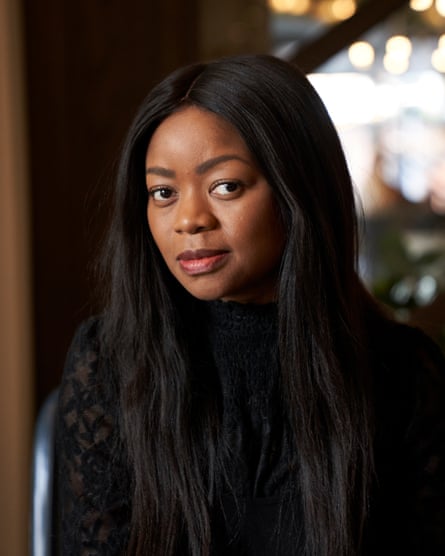
Ruby Amanfu is a Ghanaian-American vocalist and songwriter who has lived in the city on and off since she was three, but has always made her way back.
“The opportunity [in Nashville] is the reason my family came and the reason I’m still here,” she says over breakfast at the Marsh House restaurant inside the Thompson hotel, a Gulch staple. Because she was in Nashville, she attended schools where the focus was on arts, where they had a state-of-the-art studio and she was able to record as a teenager, she says.
In recent years, she has worked with the R&B star HER and Jack White, and sang on Beyoncé’s Lemonade album. That wouldn’t have been possible anywhere else, Amanfu says. “Everywhere I go, people say, ‘Oh, you’re from Nashville. Country music.’
“So we’ve had to create this community … The country community will always be embraced but now the diversity is being embraced in music. And it reaches so much farther than this city.”
Mayor Briley agrees with Amanfu, but adds that the city aiming for diversity not simply in its music and industries, but also in the community as a whole. Briley considers Atlanta and Los Angeles to be the most reasonable role models for the city’s ambition.
“We’re more likely to be like LA than Atlanta,” he says, though that might be more wishful thinking than reality. He points to Nashville’s diversifying population with the influx of immigrants and the multitude of jobs. Still, he acknowledges the myriad issues that come with success – like the soaring wealth and extreme poverty plaguing Los Angeles. He would also like to stay away from the stigma associated with Atlanta’s gentrification woes that seem to have pushed longtime residents out of the expanding city.
Barnett, though, says the city shouldn’t try to be like any city except itself. “Nashville is going to lose its culture. It’s not just individuals being moved out, it’s the heart of the city.”
Follow Guardian Cities on Twitter, Facebook and Instagram to join the discussion, catch up on our best stories or sign up for our weekly newsletter
